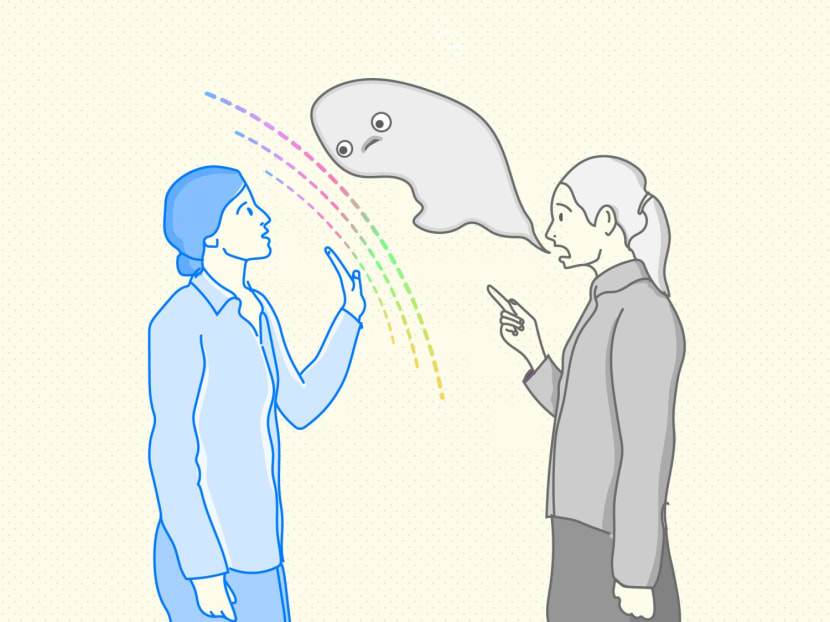Gen Zen: When does sharing become 'trauma dumping'? Here's how to establish boundaries

(Illustration: CNA/Samuel Woo)
SINGAPORE — A casual conversation with a friend about the weekend suddenly turns into a play-by-play account of their ongoing family crisis, with uninhibited divulging of their past struggles with addiction.
There are the constant midnight calls from a close friend who offloads difficult childhood memories and experiences — often in graphic and distressing detail — that leave you feeling rather ill at ease.
At first glance, these instances might seem like someone simply sharing or venting their frustrations. However, given the intensity of the subject matter and often inappropriate time and place where this sharing is done, it might be considered a case of "trauma dumping".
Counsellors and psychologists who spoke to TODAY define trauma dumping as the unsolicited sharing of one's intense personal experiences and emotions in an overwhelming manner and is often done without awareness of the impact on the listener.
Ms Liew Shi Min, director and clinical psychologist of Heartscape Psychology, said that the topics shared when someone trauma dumps are usually too private in nature coupled with an “excessive amount of personal information”.
“The receivers of trauma dumping usually feel overwhelmed by the materials shared and could even trigger the receivers' personal traumas,” she added.
Ms Diana Santoso, a counselling psychologist from Annabelle Psychology, said that while sharing troubles is seen as a way to connect people, trauma dumping can damage relationships because the listener may feel burdened, as if the person sharing is "passing" them the trauma or feel that they are responsible for "rescuing" the speaker.
To assess whether you have been the recipient of trauma dumping or have inadvertently been doing the dumping, experts who spoke to TODAY explained the key differences between trauma dumping and venting.
Along with explaining the subtleties, they gave some pointers on how to set boundaries when you think someone is trauma dumping on you.
TRAUMA DUMPING VERSUS VENTING
Trauma dumping and venting share the similarity of offering someone an outlet to release pent-up emotions.
However, trauma dumping can be differentiated from venting when taking into account the content and context in which such personal information or feelings are shared.
Ms Wong Hui Yu, a counsellor from Sofia Wellness Clinic, said that a clear sign of trauma dumping is when the speaker is excessively fixated on “unloading” their traumatic experience without checking on the listener's emotional capacity to receive the sharing.
Ms Julia Khaw, clinical psychologist from mental health platform Intellect, said another key difference is that venting typically involves expressing emotions, frustrations or concerns in a more balanced and reciprocal conversation.
“It is usually a two-way exchange where both parties participate willingly — unlike trauma dumping — and the desired goal is to release emotions, seek understanding or gain support.”
Agreeing, Ms Santoso of Annabelle Psychology said that mutual sharing or turn-taking when venting fosters trust and promotes connection.
“Trauma dumping tends to be one-sided, and the other person may not get any opportunity to share or contribute to the conversation, resulting in a more disconnected experience.”
Ms Santoso explained that even though it might seem like venting and trauma dumping have some overlaps, trauma dumping often involves “emotionally intense information” that can be “sensitive and disturbing”.
In contrast, venting typically involves less intense experiences such as daily challenges or stress from life transitions.
She added that someone who is trauma dumping may not be fully aware of their intentions to share and sometimes feel compelled to do so even when it may not be in an appropriate time or setting.
A SYMPTOM OF A BIGGER ISSUE
Although it might appear as if the person who is trauma dumping is inherently selfish by dominating the conversation, experts said that this behaviour is indicative of just how emotionally overwhelmed they are.
“A common misconception of trauma dumping is that those individuals are attention-seeking and manipulative,” Ms Liew of Heartscape Psychology said.
“It is crucial to understand that individuals who had experienced trauma are also in need of validation of their experience and are struggling with regulating their emotions.”
She said that people who are emotionally overwhelmed are often unable to read the social environment to pre-empt others of the potentially triggering materials that they are about to share.
Ms Santoso said that trauma dumping can be a sign that the person needs professional help. She emphasised that friends, family or even online communities are not substitutes.
“In fact, it is the job of mental health professionals to attend to the trauma dump.”
WHY TRAUMA DUMPING 'RUPTURES' RELATIONSHIPS
Trauma dumping harms relationships, whether they are newly formed or long-standing ones, because this kind of sharing is a form of “boundary violation”, the psychologists said.
Most times, the person listening to the one who is trauma dumping does not consent to receiving the information and might not have the emotional capacity to do so.
Ms Wong from Sofia Wellness Clinic said: “Those who find themselves consistently on the receiving end of trauma dumping may feel burnt out, resentful or helpless, and may begin to avoid the person sharing or be emotionally distanced.”
Furthermore, some people might think that trauma dumping is a “healthy act of self-expression and vulnerability” that nurtures authentic connection with others.
Ms Wong debunks this, saying that trauma dumping often creates a one-sided, pressurising and imbalanced relational dynamic that inhibits genuine intimacy.
Listeners may feel uncomfortable during the process due to the distressing nature of the sharing and possibly not know how to respond.
Ms Liew said: “For individuals who are highly and emotionally empathic and have not set clear emotional boundaries, they may experience vicarious trauma while listening to the traumatic content.”
This “unequal emotional labour” can mar relatively new relationships as well.
“Trauma dumping with a new acquaintance immediately creates an imbalanced and one-sided dynamic, which is counter to the mutuality, reciprocity and trust needed to build a new relationship,” Ms Wong said.
HOW TO ESTABLISH HEALTHY BOUNDARIES
The best way to help these people who trauma dump is for them to seek professional help, the experts said.
If you think someone is trauma dumping or even venting with you, you can help them by being self-aware about your personal capacity to handle the personal information and voice clear boundaries in a compassionate way.
This can include having a fixed time and pre-planned time of the day when you have the emotional capacity to listen.
Other ways include establishing consent when sharing and asking if it is okay to talk more about the trauma and how much information is comfortable for the listener.
Similarly, the listener may also ask for certain details to be left out of the conversation.
Other ways of establishing your boundaries can sound like this:
- I want to support you, but I think my capacity to do so is limited and I feel overwhelmed. I think it’s best for our relationship that you speak to a professional.
- I really want to be here to support you, but I need to set some parameters so that the conversation is not too overwhelming for me.
- This is difficult for me to hear. I know how important this is to you, but I may not be the right person to help you. Would you consider speaking to a professional about it?
- I don’t get a chance to share about my experience when we speak. I would prefer it that we both have a chance to talk about our difficulties.








